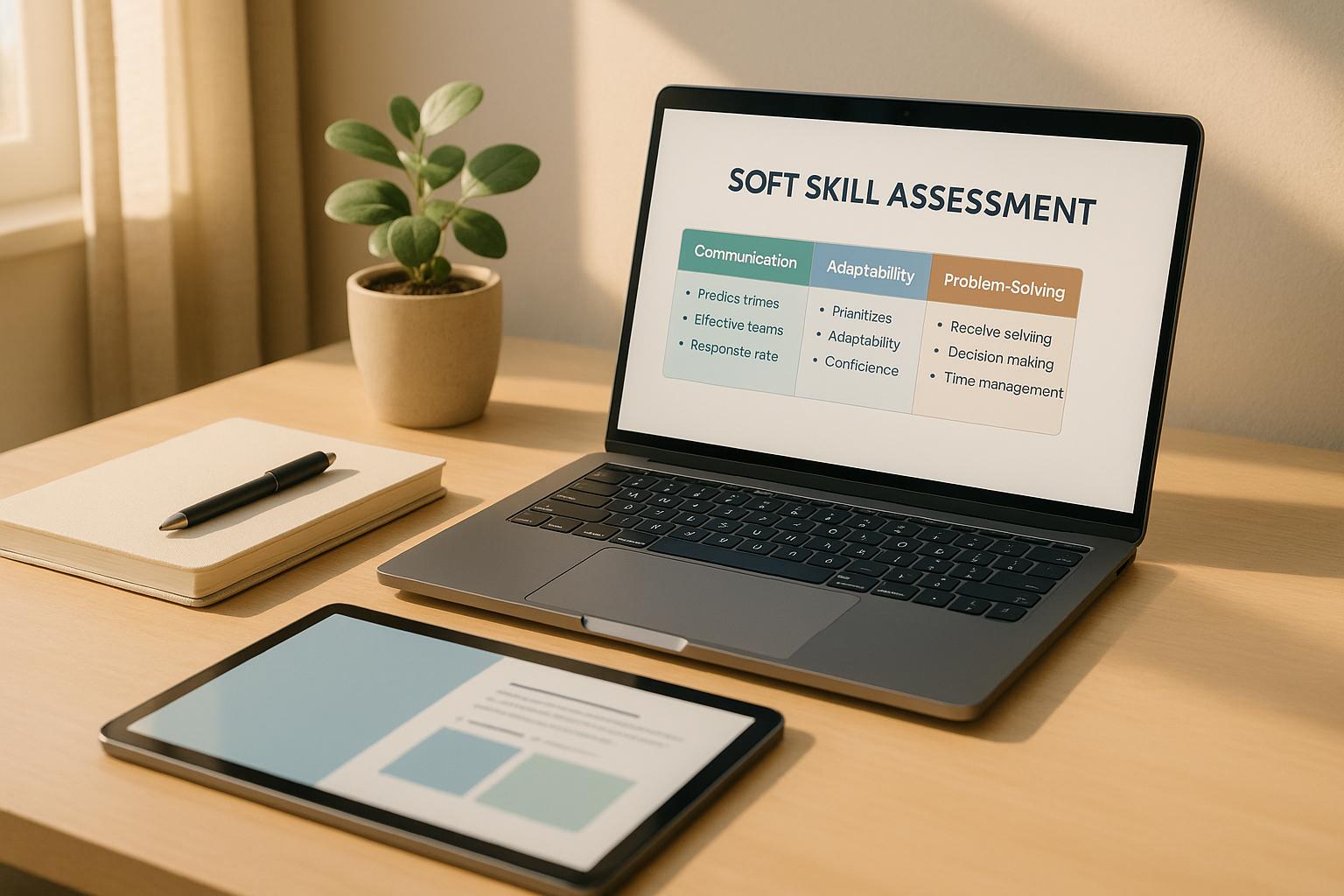Keeping customers loyal is cheaper than acquiring new ones. But crafting personalized, timely retention campaigns can overwhelm small and medium-sized businesses (SMEs). That’s where AI tools step in. These platforms analyze customer data, predict churn, and automate follow-ups to help businesses retain customers effortlessly. Here’s a quick overview of seven AI tools designed to simplify retention strategies:
- SalesCloser AI: Excels in real-time conversational AI for B2B businesses.
- Klaviyo: Perfect for e-commerce with deep integrations and predictive analytics.
- Appcues: Focuses on in-app user experiences and onboarding for SaaS.
- Amplitude: Offers advanced analytics and behavioral insights for data-driven strategies.
- Intercom: Combines customer messaging, live chat, and automated follow-ups.
- Kommunicate: Blends chatbots and live chat for multi-channel customer support.
- Shopify Magic: Tailored for Shopify store owners with built-in churn prediction.
Quick Comparison
| Tool | Starting Price (USD/month) | Key Strengths | Best For | Integration Options |
|---|---|---|---|---|
| SalesCloser AI | $97 | Advanced conversation AI | B2B companies | CRM systems, email tools |
| Klaviyo | $20 | E-commerce automation | Online retail | Shopify, WooCommerce |
| Appcues | $249 | In-app messaging, onboarding | SaaS companies | Segment, Salesforce |
| Amplitude | $0 (Free tier available) | Behavioral analytics | Data-focused teams | 1,000+ API connections |
| Intercom | $39 | Conversational messaging | Customer support | Salesforce, HubSpot |
| Kommunicate | $40 | Chatbot and live chat integration | SMEs | WhatsApp, Zendesk |
| Shopify Magic | Included with Shopify plans | Predictive analytics for retention | Shopify store owners | Shopify ecosystem |
These tools cater to various industries and budgets, helping businesses automate retention while maintaining a personal touch. Choose based on your goals, integrations, and pricing needs.
How to Use AI to Improve Customer Retention with Shanif Dhanani from Apteo
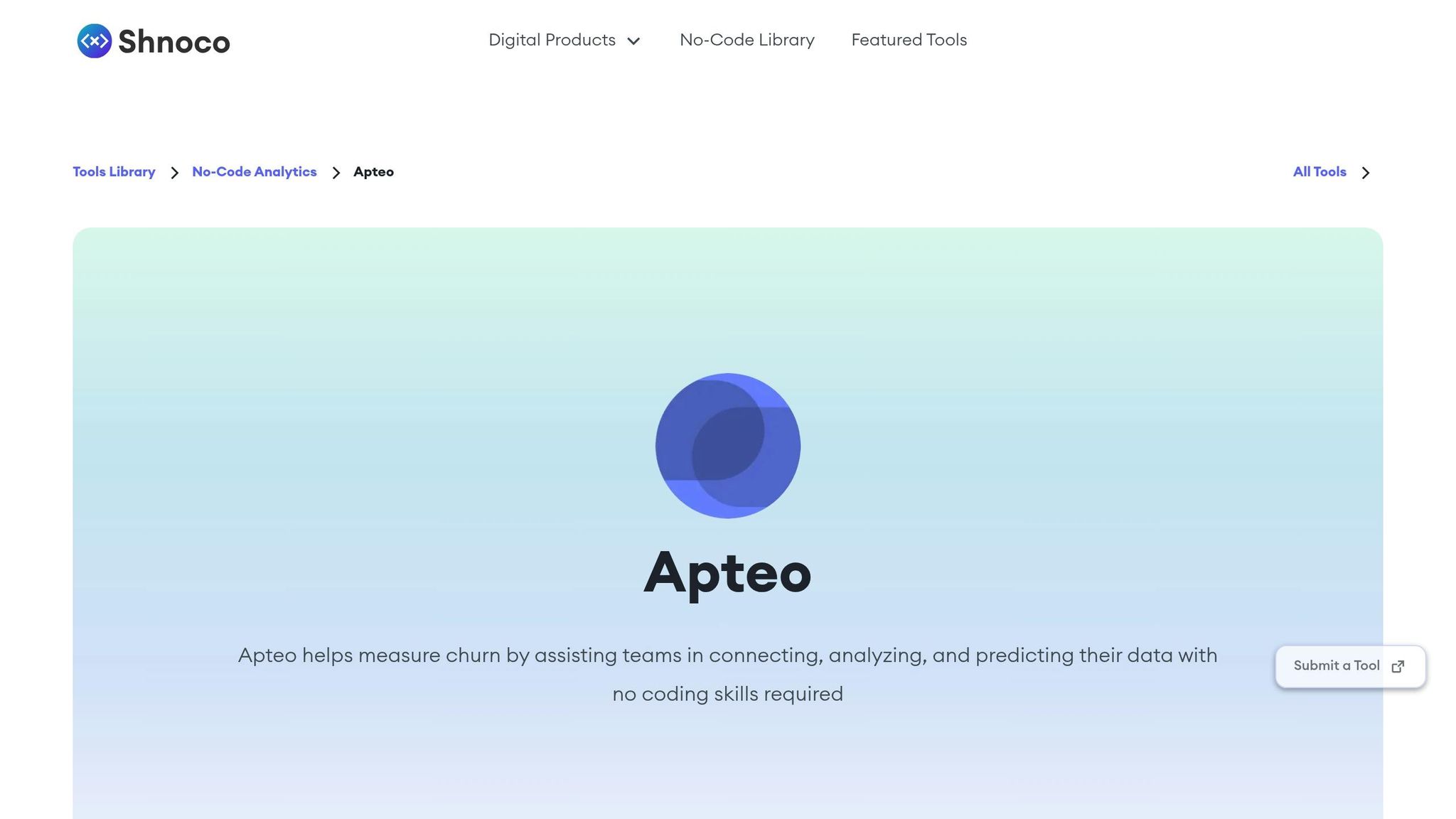
How to Choose AI Retention Tools
Selecting the right AI retention tool can make or break your retention strategy. With so many options out there, it’s essential for small and medium-sized enterprises (SMEs) to focus on tools that deliver measurable outcomes without overloading their teams or budgets. Here’s what to prioritize when evaluating these tools:
Personalization at Scale is a must-have feature. A good tool should go far beyond simply inserting a customer’s name into an email. Look for platforms that analyze customer behavior, purchase history, and engagement patterns to craft genuinely tailored experiences. The most effective tools can adjust messaging tone, recommend products, and even optimize communication timing based on each customer’s unique profile.
Predictive Analytics is another game-changer. The best AI tools can identify customers who are likely to churn well before they actually leave. By analyzing patterns like reduced engagement, fewer purchases, or changes in browsing habits, these tools enable you to take proactive steps to retain customers - far more effective than trying to win them back after they’ve already walked away.
Automated Follow-ups should feel natural and authentic. High-quality AI platforms can send personalized messages triggered by a customer’s actions - or inaction. Whether it’s a reminder about an abandoned cart, a thank-you for a milestone purchase, or a re-engagement effort for inactive users, automation should maintain your brand’s tone while delivering relevant value at just the right moment.
Customer Segmentation is critical for targeting the right people with the right message. The most effective tools create dynamic segments that update automatically based on real-time customer behavior. This ensures your campaigns remain relevant as customer preferences evolve. Additionally, make sure the tool integrates seamlessly with your existing systems to avoid data silos.
CRM Integration is non-negotiable. Your AI retention tool should connect effortlessly with your customer relationship management system, e-commerce platform, and other tools. Without proper integration, you risk creating disconnected data and missing key opportunities. Look for solutions that sync data bidirectionally and update records in real time.
Budget Considerations are especially important for SMEs. Many AI tools offer tiered pricing based on factors like contact volume, features, or usage limits. Take the time to evaluate all associated costs. Some platforms charge per email sent, while others use a flat monthly rate. Choose a pricing structure that aligns with your current needs and growth plans.
Ease of Use can’t be overlooked. Complicated tools that require extensive training or technical expertise often fail in SME settings, where team members juggle multiple roles. Look for platforms with intuitive interfaces, drag-and-drop campaign builders, and strong onboarding support. The goal is to empower your team to create impactful campaigns without needing advanced technical skills.
Reporting and Analytics help you track success and refine your strategies. Choose tools that offer customizable dashboards, automated reports, and clear ROI metrics. Features like A/B testing and automated optimization based on results can significantly enhance the effectiveness of your campaigns.
Scalability matters as your business grows. The tool you choose should be able to handle increased data and evolving feature needs. Some tools that work well for smaller businesses may become limiting as you expand, leading to costly and time-consuming migrations down the line.
Customer Support can make a big difference, especially during implementation and ongoing use. SMEs often need hands-on assistance to get the most out of their tools. Look for providers that offer fast issue resolution, responsive support, and accessible training resources. Some even provide dedicated customer success managers to guide you through the process, while others rely more on self-service options.
1. SalesCloser AI
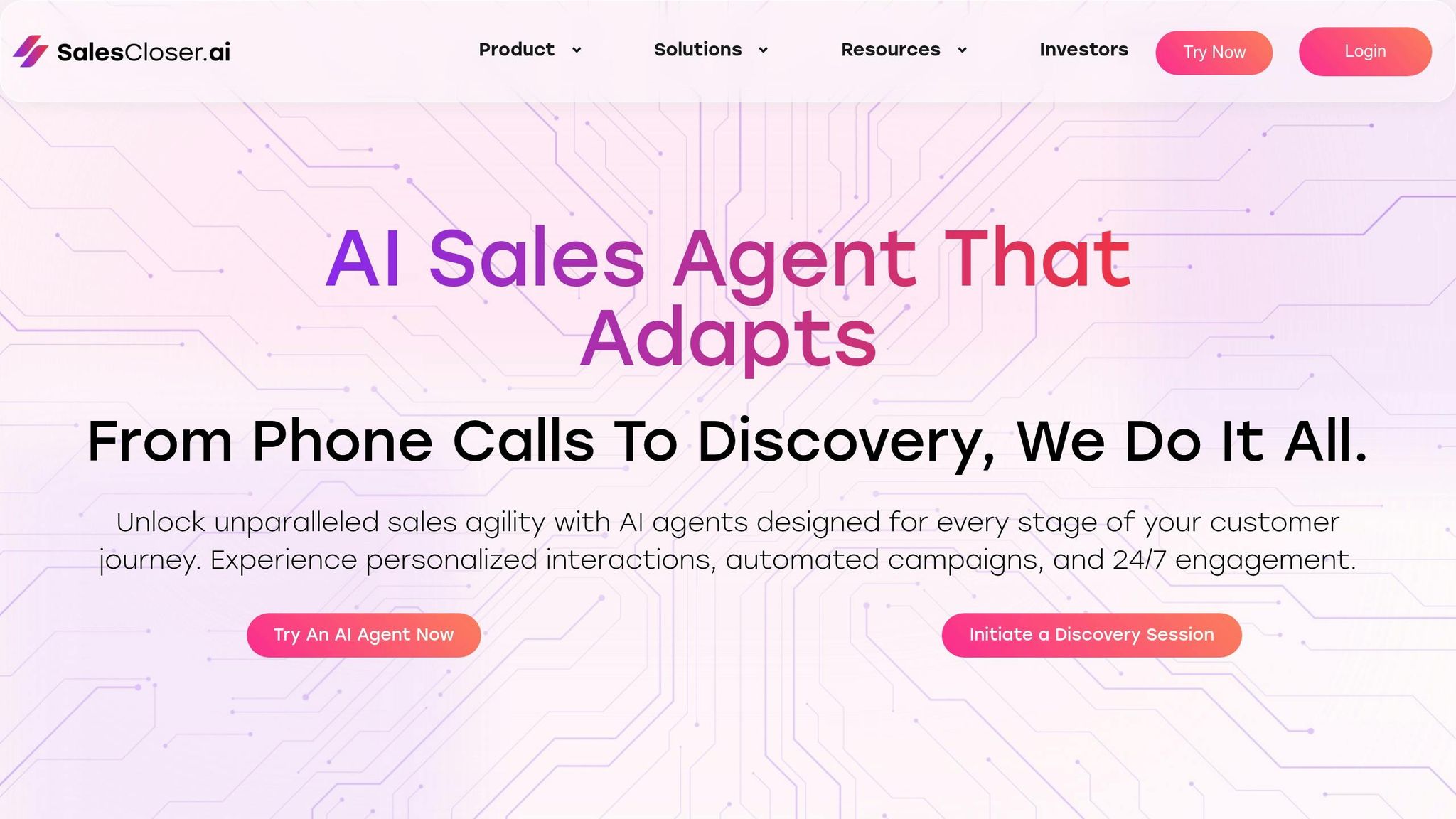
SalesCloser AI stands out when it comes to features like personalization, automation, and CRM integration, making it a strong ally for customer retention strategies. By leveraging AI-driven conversations, this platform re-engages customers effectively throughout their journey.
Personalization Capabilities
Personalized interactions are at the heart of customer retention, and SalesCloser AI takes this to the next level. It uses data from past customer interactions to create tailored conversation flows. Its conversation intelligence adjusts messaging in real time based on customer responses, fine-tuning tone and content to match the situation. This ensures a smooth and consistent experience for customers across all interactions.
Automated Follow-ups
The platform’s automated follow-up system is designed to keep customers engaged. It triggers re-engagement messages at the right time, adapting the content based on how customers respond. This dynamic approach ensures that communications are timely, relevant, and aligned with customer behavior.
Integration with Existing CRM and Marketing Platforms
SalesCloser AI works effortlessly with major CRMs like Salesforce, HubSpot, and Pipedrive, as well as email marketing tools like Mailchimp. It syncs customer insights and conversation data in real time, sending alerts based on predefined triggers. The platform also supports custom API connections, enabling businesses to integrate data from e-commerce, support, and analytics systems for a more comprehensive view of customer interactions.
2. Klaviyo
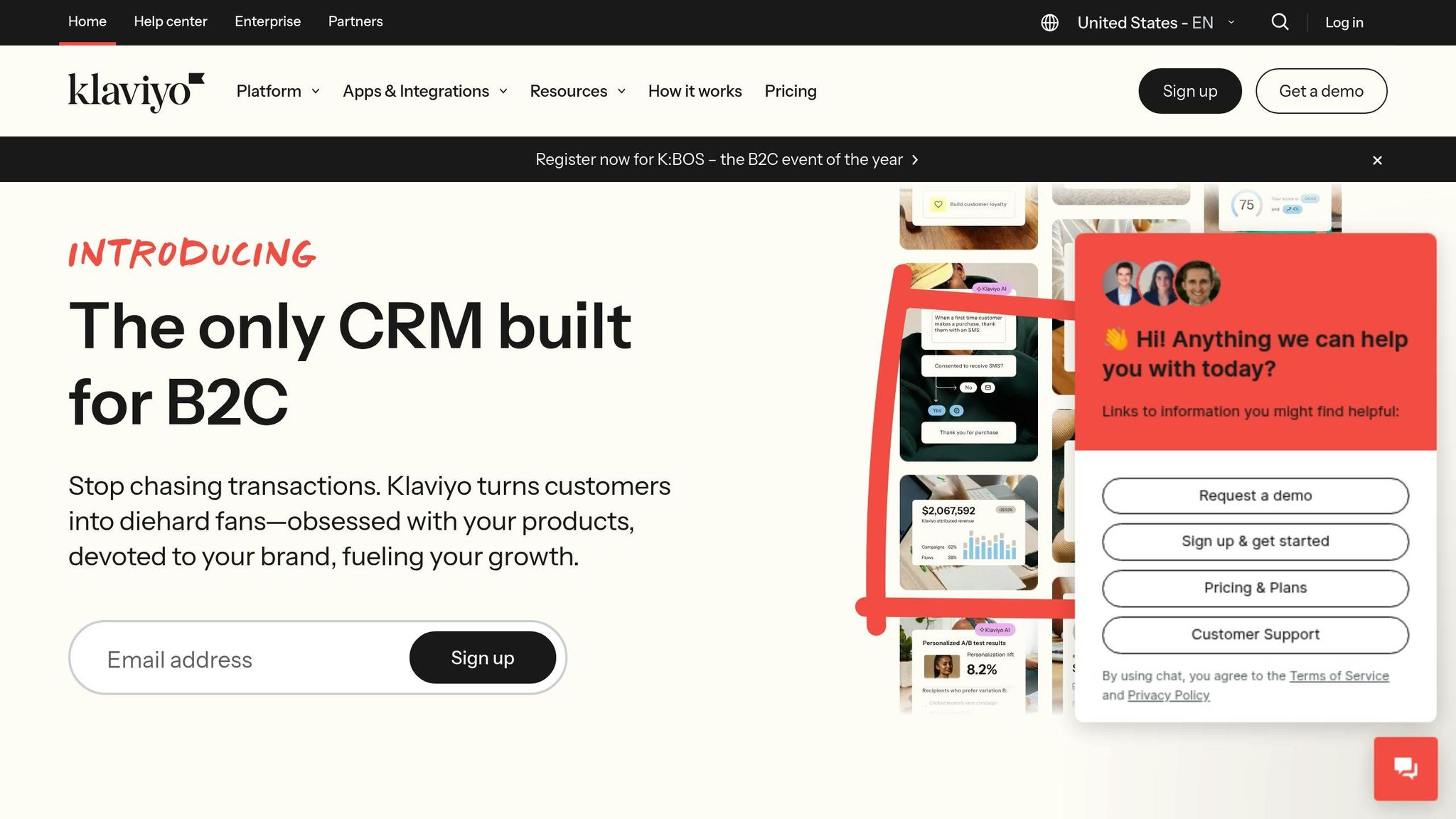
Klaviyo simplifies retention strategies by offering over 350 integrations, making it easy to connect with your existing business tools. Whether you're using Shopify, WooCommerce, Salesforce, or HubSpot, Klaviyo ensures a smooth flow of data for a complete view of your customers. Plus, with its API, you can create custom integrations tailored to your proprietary systems or niche tools, allowing for real-time data syncing. This setup empowers businesses to run retention campaigns that are both timely and effective.
3. Appcues
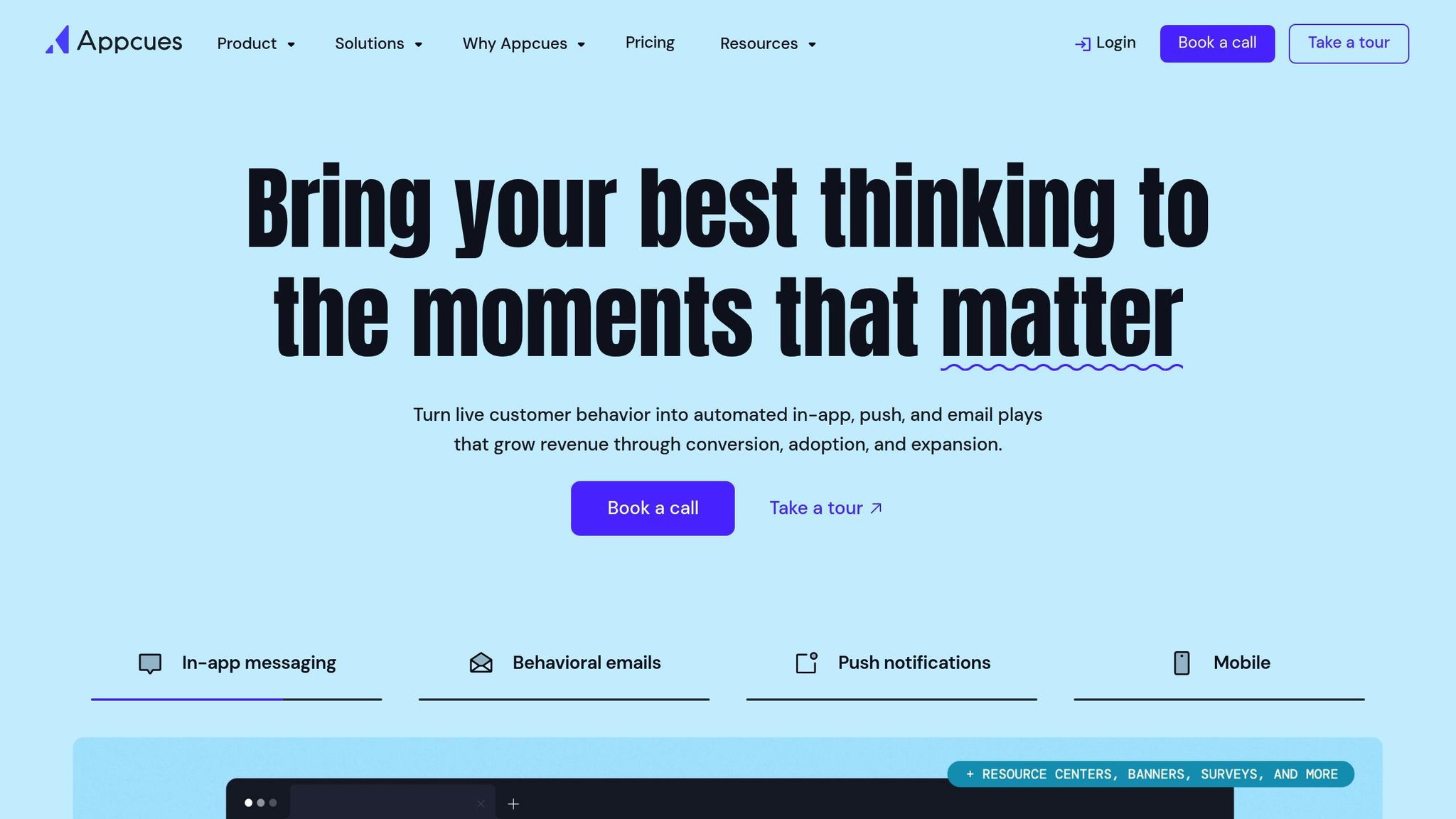
Appcues is a user onboarding and product adoption platform designed to help businesses retain customers by crafting targeted in-app experiences based on behavioral data. By identifying disengaged users and delivering contextual messages, tooltips, and guided tours, the platform works to reduce churn and improve user engagement.
Personalization Capabilities
Appcues excels at creating customized user experiences by segmenting users according to their behavior, demographics, and engagement levels. This ensures that every customer gets guidance tailored to their specific needs. For instance, you can design unique experience flows for different user types, making sure administrators, end-users, or power users get the most relevant onboarding or feature highlights.
The platform enables personalization using user properties such as company size, role, subscription tier, or feature usage. A SaaS company, for example, can create one onboarding flow for administrators managing account settings and another for end-users focused on daily tasks. Similarly, advanced features can be showcased to users who have already mastered the basics, ensuring a more meaningful experience.
Appcues also uses behavior and demographic data to trigger well-timed, context-aware messages. Instead of overwhelming users with generic notifications, it delivers personalized guidance when users are most likely to engage or explore new features.
Integration with Existing CRM and Marketing Platforms
Appcues pairs its personalization tools with seamless integration into your existing tech ecosystem. It connects with over 20 popular business tools, including Salesforce, HubSpot, Mixpanel, Amplitude, and Segment. These integrations allow you to sync user data across platforms, providing a unified view of your customer journey from acquisition to retention.
The platform's two-way data sync ensures that actions taken within Appcues - like completing a guided tour or interacting with a retention campaign - are automatically reflected in your CRM or analytics tools. This keeps your team informed and enables smarter follow-up actions.
For businesses using custom systems or niche tools, Appcues offers webhook support for real-time data sharing. This flexibility allows businesses to integrate Appcues into virtually any tech stack without major disruptions or data silos.
Appcues also integrates with marketing automation platforms like Mailchimp and Marketo. This means you can trigger email campaigns based on in-app behavior or pause email sequences when users are actively engaging with in-app experiences, ensuring a cohesive communication strategy across channels.
4. Amplitude
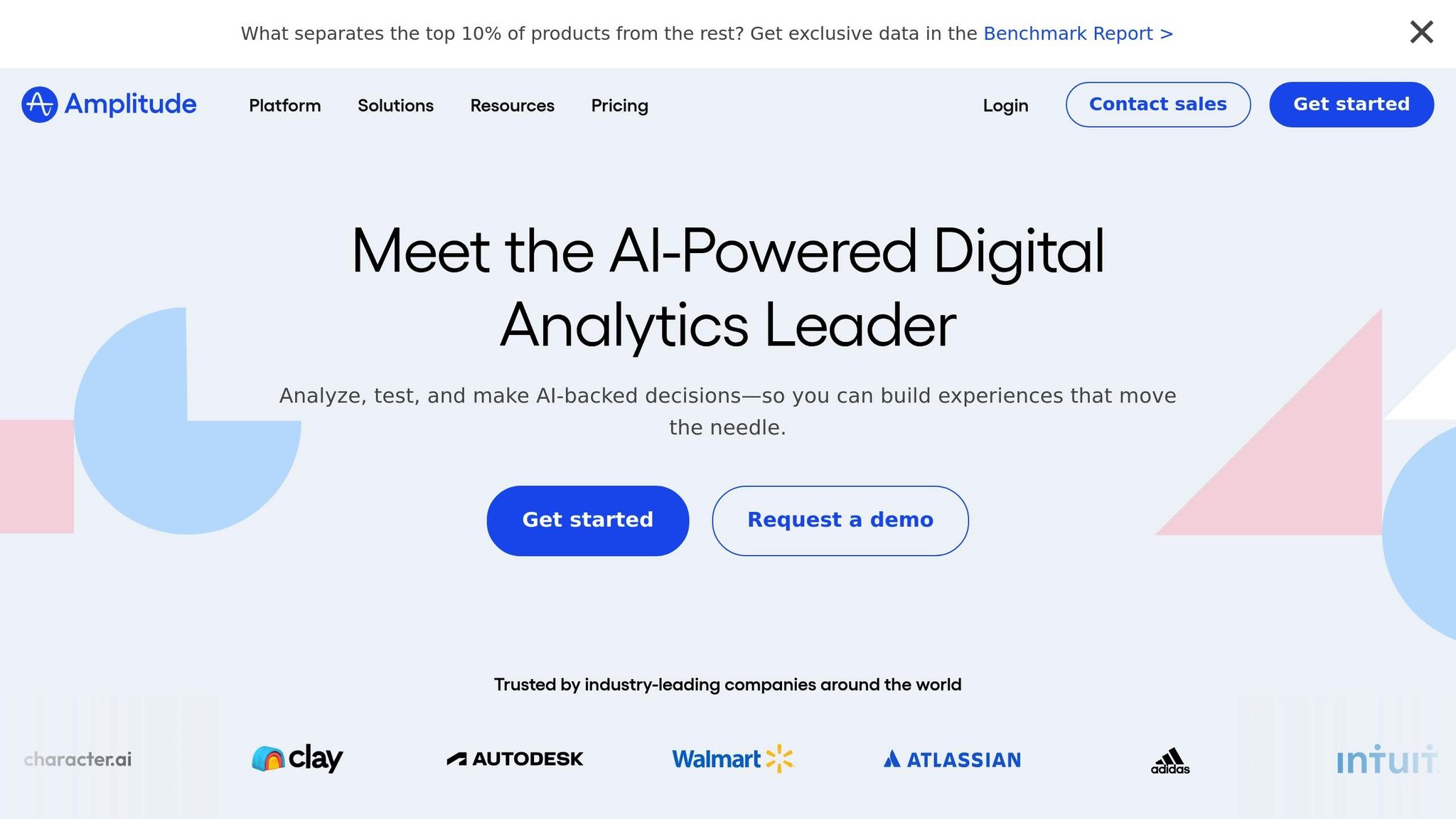
Amplitude is a powerful analytics platform designed to help businesses understand customer behavior and turn that knowledge into action. It enables you to segment users and track engagement, providing the insights needed to design smarter retention campaigns.
One of its standout features is cohort analysis, which allows businesses to observe how different groups of users behave over time. By identifying patterns and trends within these groups, companies can fine-tune their retention strategies to better meet customer needs.
Another advantage of Amplitude is its ability to integrate with essential business tools. This seamless integration ensures that teams can easily share and access data, making it simpler to act on insights quickly and effectively. The result? More informed decisions that directly contribute to improving customer retention.
sbb-itb-bec6a7e
5. Intercom
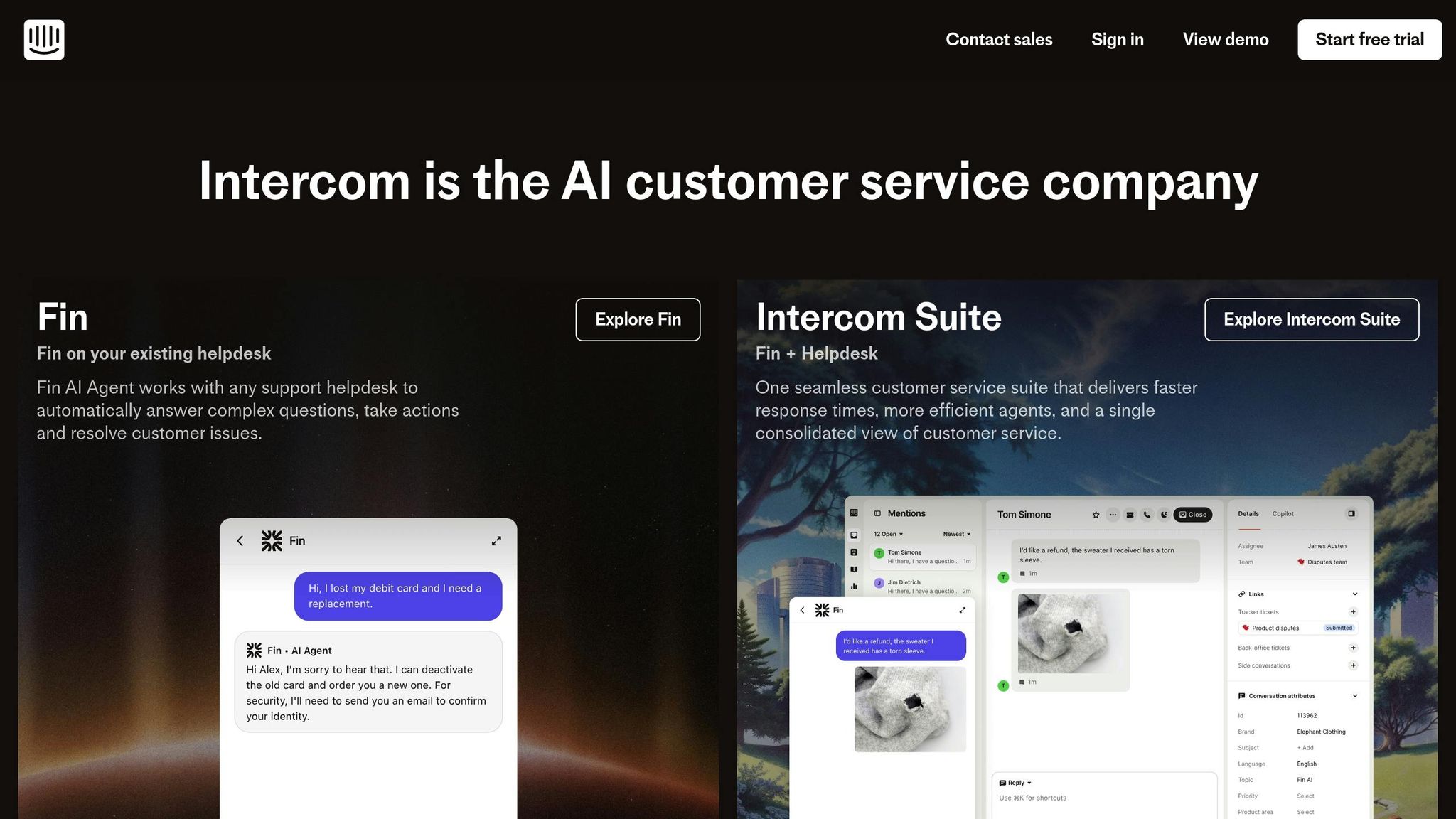
Intercom is a customer messaging platform designed to drive timely and meaningful engagement throughout the customer retention journey. By monitoring user behavior, it can automatically start conversations when customers disengage or reach important milestones.
Personalization Capabilities
Intercom’s personalization features go far beyond simple demographics. It tracks user actions, preferences, and engagement patterns to craft messages that feel genuinely tailored to each individual.
The platform segments customers based on behavior, subscription status, and custom tags like onboarding progress or user preferences. This allows businesses to send messages that align perfectly with what each customer needs at the moment.
Automated Follow-ups
Intercom’s Series feature enables multi-step email and in-app message sequences triggered by specific events - like declining activity levels or upcoming subscription renewals. The system automatically adjusts the timing and content of messages, even pausing the automation if a customer responds, ensuring communication feels natural and not overly automated.
This smooth automation works seamlessly alongside its broad integration options.
Integration with Existing CRM and Marketing Platforms
Intercom connects with major tools like Salesforce, HubSpot, Mailchimp, and Zapier, providing a unified view of your customers. Its API allows for custom integrations, syncing data such as product usage, billing details, and support interactions. With bidirectional data syncing, your CRM stays updated with real-time engagement insights, helping you make smarter decisions about retention strategies.
6. Kommunicate
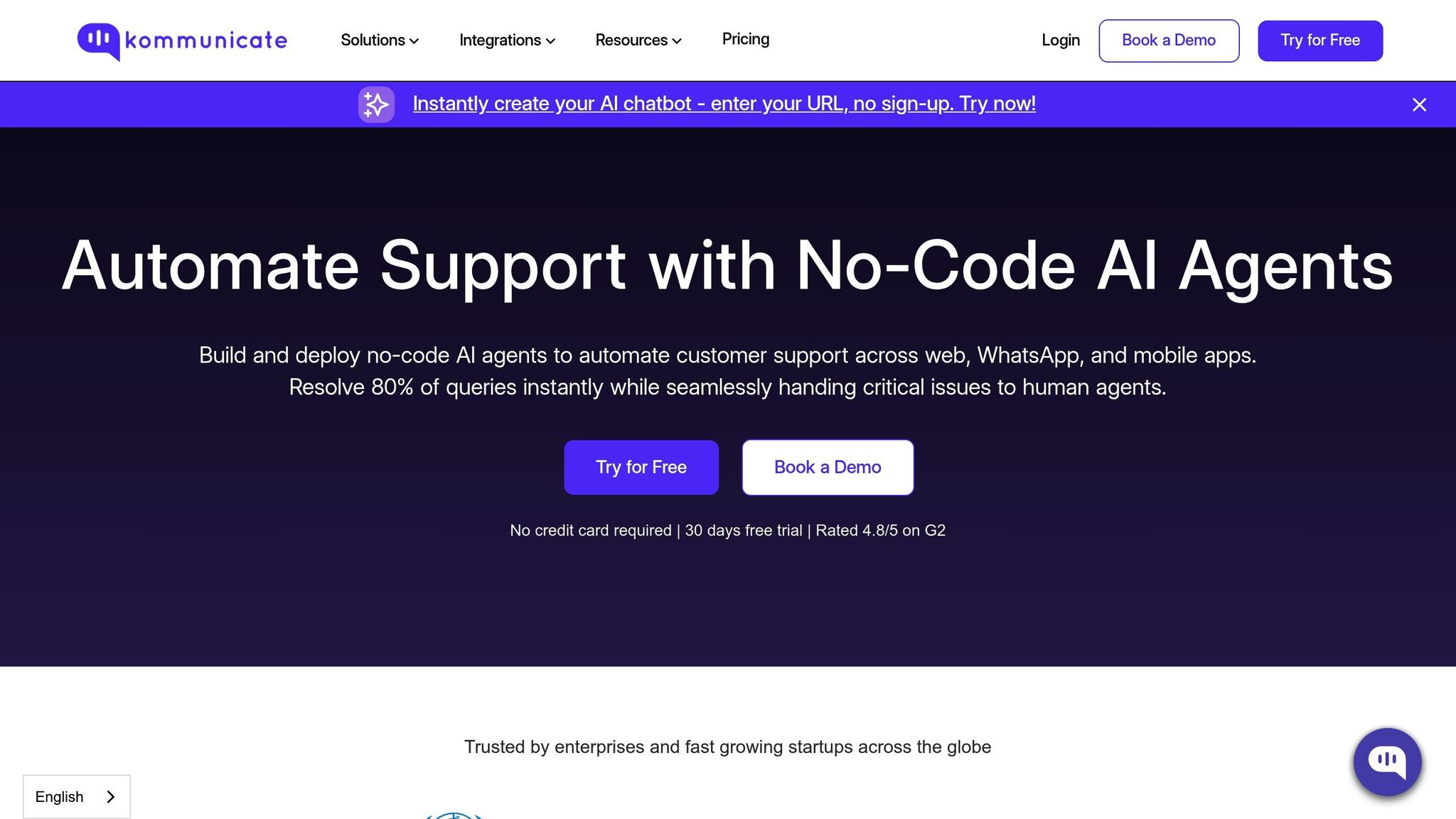
Kommunicate is an AI-driven platform designed to revolutionize customer support and engagement. By blending chatbots, live chat, and automated messaging, it helps businesses create seamless conversational experiences that keep customers engaged and reduce churn.
Personalization Capabilities
Kommunicate takes personalized communication to the next level by diving deep into interaction history, purchase patterns, and support tickets. This allows businesses to craft campaigns tailored to specific customer needs. It segments users into categories like frequent buyers, at-risk users, or recent subscribers, helping businesses deliver the right message to the right audience. For example, customers who might be at risk of leaving could receive proactive support offers, while loyal customers might enjoy exclusive updates or early access to new features.
Automated Follow-ups
With its automated follow-up system, Kommunicate ensures no customer is left behind. The platform triggers retention campaigns based on specific customer behaviors - or lack thereof. For instance, if a customer becomes inactive, it can initiate a re-engagement sequence through the most effective channel.
These sequences can include welcome emails for new customers, win-back campaigns for those who’ve gone quiet, or renewal reminders for subscription-based users. The AI fine-tunes the timing and frequency of these follow-ups, ensuring they strike the perfect balance between being effective and non-intrusive.
Integration with Existing CRM and Marketing Platforms
Kommunicate seamlessly integrates with popular CRMs like Salesforce, HubSpot, and Pipedrive, as well as marketing tools such as Mailchimp and Marketo. This ensures a unified ecosystem where customer data flows smoothly between sales, support, and marketing teams.
The platform’s API also supports custom integrations with e-commerce platforms like Shopify and WooCommerce. This makes it easy to trigger retention campaigns based on actions like purchase history, cart abandonment, or product usage. With real-time data synchronization, every customer touchpoint stays consistent and up-to-date across your entire tech stack.
7. Shopify Magic
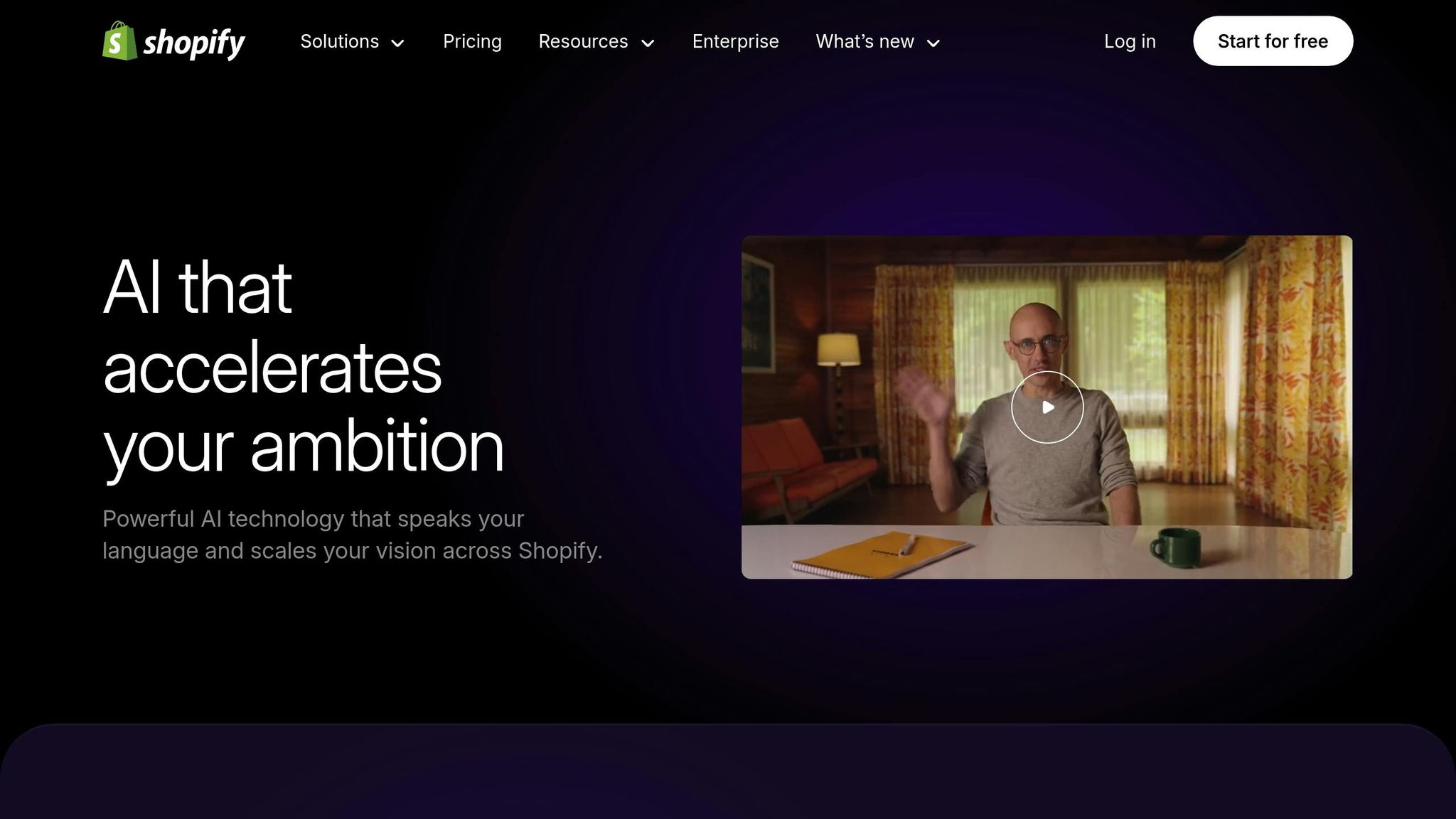
Shopify Magic is an AI-powered suite built directly into Shopify, designed to simplify customer retention for e-commerce businesses. By being part of the Shopify ecosystem, it eliminates the hassle of juggling multiple third-party tools, making it especially appealing for small to medium-sized businesses already using the platform. Shopify Magic uses data to craft personalized, timely retention campaigns, fitting seamlessly into Shopify's data-driven approach to customer engagement.
Personalization Capabilities
Shopify Magic taps into Shopify’s rich customer data to deliver highly tailored retention campaigns. It analyzes purchase history, browsing habits, seasonal buying trends, and product preferences to segment customers into meaningful groups. For example, it can identify shoppers who buy winter apparel in October and send them early-season promotions to encourage repeat purchases.
The platform goes even further by categorizing customers based on their shopping behavior. Bargain hunters might receive discount codes, premium buyers could be offered exclusive early access to new products, and impulse shoppers might get reminders about their abandoned carts. This level of detail ensures that each customer gets messages that align with their unique shopping habits.
Predictive Analytics
Beyond just personalization, Shopify Magic uses predictive analytics to anticipate customer behavior. One standout feature is its ability to detect churn risk before customers drift away. By monitoring patterns like reduced order frequency, longer gaps between purchases, and declining email engagement, the system assigns a risk score to each customer. This enables businesses to proactively reach out with tailored offers to re-engage these at-risk shoppers.
The platform also predicts the best timing for retention campaigns. For instance, if a customer tends to shop on weekends or responds better to emails sent in the evening, Shopify Magic schedules campaigns accordingly. Over time, the AI learns from campaign results, continuously refining its predictions to improve future outcomes.
Automated Follow-ups
Shopify Magic shines in its ability to create dynamic, multi-step retention sequences that adjust based on customer responses. If a once-regular customer hasn’t made a purchase within their usual buying cycle, the system might start with a friendly "we miss you" email, follow up with a discount offer, and then close with a limited-time exclusive deal.
For subscription-based products, Shopify Magic handles renewal reminders with precision, helping to reduce churn caused by expired payment methods or forgotten renewals. It also manages post-purchase follow-ups, ensuring customers feel valued and engaged long after their initial transaction.
Integration with Existing CRM and Marketing Platforms
Although Shopify Magic is built to work seamlessly within the Shopify ecosystem, it also integrates effortlessly with external tools. It connects with email platforms like Mailchimp and Klaviyo, customer support tools such as Zendesk, and analytics services like Google Analytics, ensuring smooth data flow across your entire marketing stack.
The integration extends to inventory management systems, enabling smarter retention campaigns. For example, if a customer’s favorite product is running low, the system can trigger a "last chance" email. On the flip side, it can pause campaigns for out-of-stock items and resume them once inventory is replenished, preventing frustration and keeping campaigns effective.
Tool Comparison Table
Choosing the right tool can feel like a daunting task, especially when juggling features, pricing, and compatibility with your business needs. To simplify the process, here’s a breakdown of seven tools, highlighting what they bring to the table and how they align with various business goals. Below the table, you'll find insights to help you interpret the data and make an informed decision.
| Tool | Starting Price (USD/month) | Key Strengths | Best For | Integration Options | Unique Features |
|---|---|---|---|---|---|
| SalesCloser AI | $97 | Advanced conversation AI, lead qualification | B2B companies, high-ticket sales | CRM systems, email platforms, webhooks | Real-time conversation analysis, sentiment scoring |
| Klaviyo | $20 | Email/SMS automation, deep e-commerce integration | E-commerce businesses, retail | Shopify, WooCommerce, Magento, 300+ apps | Predictive analytics, advanced segmentation |
| Appcues | $249 | In-app messaging, user onboarding | SaaS companies, mobile apps | Segment, Mixpanel, Salesforce, Slack | No-code message builder, behavioral triggers |
| Amplitude | $0 (Free tier available) | Advanced analytics, behavioral insights | Data-driven companies, product teams | 1,000+ integrations via APIs | Cohort analysis, funnel optimization |
| Intercom | $39 | Conversational support, live chat | Customer service teams, SaaS | Salesforce, HubSpot, Slack, Zapier | Resolution Bot, custom chatbots |
| Kommunicate | $40 | Multi-channel support, chatbot automation | SMEs, customer support teams | WhatsApp, Facebook, Slack, Zendesk | Human + bot hybrid approach |
| Shopify Magic | Included with Shopify plans | Native e-commerce integration, predictive analytics | Shopify store owners | Mailchimp, Klaviyo, Google Analytics | Churn prediction, inventory-based campaigns |
Key Takeaways
When comparing these tools, it’s essential to look beyond the price tag and focus on how well their features align with your goals:
- Pricing Flexibility: Options range from Amplitude’s free tier to Appcues at $249/month, making these tools accessible for both startups and established companies.
- Integration Power: Klaviyo stands out with over 300 app integrations, while Amplitude offers unmatched flexibility with 1,000+ API connections.
- Feature Specialization: Each tool shines in its niche. For instance:
- SalesCloser AI is ideal for B2B companies navigating long, complex sales cycles, thanks to its advanced conversation intelligence.
- Klaviyo is a go-to for e-commerce automation, offering tools like predictive analytics and segmentation to drive sales.
- Appcues caters to SaaS businesses, excelling in user onboarding and in-app messaging.
- Intercom provides strong conversational customer support, perfect for enhancing user satisfaction.
- Shopify Magic delivers tailored solutions for Shopify store owners, focusing on predictive analytics and sales-driven campaigns.
Matching Tools to Business Needs
The right choice depends on your specific goals and team structure. For instance, e-commerce businesses often benefit from tools like Klaviyo or Shopify Magic, as these directly impact sales and customer retention. On the other hand, SaaS companies can gain measurable improvements in user engagement and onboarding with Appcues or Intercom.
Ultimately, selecting a tool that fits your data requirements and scales with your team’s capacity ensures long-term success.
Success Stories from SMEs
When it comes to small and medium-sized enterprises (SMEs), success often hinges on finding smarter ways to connect with customers and streamline operations. Here are a few examples of how AI has reshaped the way these businesses thrive.
A men's grooming e-commerce brand tackled cart abandonment by automating personalized email campaigns. By using customer behavior as a guide, they sent timely, tailored messages that not only brought customers back but also strengthened loyalty.
A software consulting firm turned to AI to handle routine follow-ups. This automation improved lead nurturing, allowing the team to focus on closing deals faster, which translated into higher conversion rates.
A fitness app startup took their customer support to the next level with an AI-powered chat solution. The result? Lightning-fast response times that left customers happy and boosted retention rates.
A Shopify artisan retailer leaned on AI to pinpoint at-risk customers. With targeted campaigns, they reengaged dormant shoppers and even managed to fine-tune their inventory for better efficiency.
These real-world examples highlight how AI isn't just a tool for big corporations - it's a game-changer for SMEs too.
Conclusion
AI-powered retention tools are changing the game for small and medium-sized enterprises (SMEs) across the United States. What used to be tedious, manual processes are now streamlined into automated systems, ensuring continuous and efficient customer engagement.
The key to success lies in selecting tools that align with your specific business needs. For instance, Shopify store owners may prioritize seamless integrations, while SaaS companies often benefit from tools offering advanced behavioral analytics. The great thing about today’s AI options is that there’s a solution for nearly every business model and budget. Choosing features that match your budget ensures your retention strategy remains effective and manageable.
Budget considerations play a significant role. Instead of opting for high-cost, enterprise-level solutions, many businesses find that mid-tier tools like Klaviyo or Kommunicate provide the automation capabilities they need without overspending. These tools strike a balance between affordability and functionality, making them a smart choice for SMEs.
When integrated into your business processes, AI doesn’t replace the human touch - it enhances it. By handling repetitive tasks, AI frees up time for you to focus on building authentic customer relationships. Whether it’s sending personalized emails, launching targeted campaigns, or offering instant support, AI ensures precision and consistency that manual efforts simply can’t match.
For SMEs looking to explore further, platforms like AI for Businesses offer valuable insights into how these tools can fit into a larger digital transformation strategy. By adopting smart, automated solutions, businesses can strengthen customer relationships and embrace a more efficient future. Intelligent automation isn’t just the future of customer retention - it’s accessible for businesses of all sizes today.
FAQs
How can AI tools help small and medium-sized businesses improve customer retention campaigns?
AI tools give small and medium-sized businesses (SMEs) the ability to design smarter customer retention campaigns using advanced technologies like machine learning and predictive analytics. These tools dig into customer behavior, preferences, and feedback to create personalized experiences that truly connect with individual customers.
Here’s how AI can help SMEs:
- Dynamically group customers based on real-time data insights.
- Deliver custom recommendations and promotions tailored to individual preferences.
- Offer immediate, AI-driven support through chatbots.
By predicting what customers need and spotting signs of potential churn, AI allows businesses to act quickly to boost satisfaction and loyalty. This approach not only enhances customer relationships but also makes retention strategies more manageable and effective, even for businesses with tighter budgets.
What should SMEs look for in an AI tool to improve customer retention, and why does it matter?
When choosing an AI tool to boost customer retention, small and medium-sized enterprises (SMEs) should focus on four key features: scalability, ease of integration, data security, and personalization capabilities. These elements are critical for ensuring the tool can adapt as your business grows, work smoothly with your existing systems, protect sensitive customer information, and deliver customized experiences that strengthen loyalty.
By prioritizing these factors, SMEs can nurture deeper customer connections, increase retention rates, and achieve sustainable growth - all without sacrificing efficiency or security.
How do AI tools use predictive analytics to reduce customer churn and improve retention?
AI tools use predictive analytics to dig into historical customer data and uncover patterns that hint at potential churn. By identifying customers who might leave, businesses can step in early to keep them engaged.
These tools make personalized strategies possible, like offering tailored deals, crafting customized messages, and ensuring timely interactions. This focused effort not only addresses customer concerns but also builds stronger relationships, increasing loyalty and improving retention rates over time.
